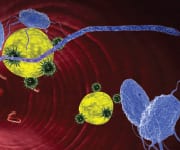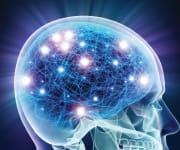Life Extension Magazine®
Anxiety and mood disorders are now being recognized as major medical and societal issues.
In the United States alone, close to 48 million prescriptions were written in 2011 for the anti-anxiety drug Xanax®. One in 10 Americans takes an antidepressant medication.1,2
In an alarming recent study, scientists found anxiety shortens telomere length and accelerates cellular aging. Put another way, uncontrolled anxiety may reduce one’s life span.3,4
With millions of people medicated for mood disorders that include anxiety and mild depression, researchers have sought a safer way to reduce their impact.
In a unique discovery, two specific probiotic organisms have been identified that show impressive reductions in the manifestation of stress, anxiety, and depression.
Human studies on these two unique probiotics show notable results. For example, one study showed a 50% decrease in depression scores while another showed a 55% improvement in anxiety scores.5,6
While it may seem remarkable that a probiotic can have effects outside of the gastrointestinal tract, a massive accumulation of data suggests that the gut is, in fact, practically a “second brain,” with a powerful and lasting impact on mood.7
“Gut-Brain Axis”
Depression and anxiety are highly prevalent in the US (and around the world), affecting approximately 6.7% and 18.1% of Americans respectively.8,9
Until quite recently, these mental health disorders were viewed as primarily related to brain function, since it has long been believed that the brain is solely responsible for thoughts, feelings, and behavior.
There is an increasing awareness among scientists of the role played by the microorganisms that live in the gastrointestinal tract in affecting other body systems, including the brain.10 At nearly 100 trillion individual organisms, these cells outnumber the body’s own cells by 10 to 1, possessing nearly 100 times as many genes.11 That gives them a lot of leverage.
In fact, the close relationship between the microbes in the gastrointestinal tract and the biochemical functioning of brain cells and structures has given rise to the term gut-brain axis, indicating that what happens in the gut can affect the brain, and vice versa.12,13
Animal studies show that the makeup of organisms in the gastrointestinal tract (intestinal flora) can affect brain development in young animals, influencing specific behaviors such as anxiety.14,15 Conversely, early life stresses can change the makeup of the gastrointestinal flora, accompanied by increases in stress hormones such as cortisol, in immune system responses, and in intestinal pain sensations.16
Therefore, deliberately introducing changes to the gastrointestinal flora through supplementation with probiotics is an exciting new way to introduce changes in how the brain functions, including how people experience emotions.10,17-19
Reducing Anxiety, Depression, and Stress Safely
 |
- Stress, anxiety, and depression affect millions of Americans.
- Mainstream medicine relies on costly medications, with only partial effectiveness and substantial side effects, in an attempt to manage these conditions.
- The recognition of the enormous role played by the intestinal flora, the community of microorganisms living in our intestines, has shifted attention to these organisms as potential partners in managing human mental illnesses.
- Changing the composition of the intestinal flora has been shown in animal studies to significantly affect behaviors and biochemical markers of stress, anxiety, and depression.
- The combination of Lactobacillus helveticus R0052 and Bifidobacterium longum R0175 was specifically developed with mental health in mind.
- This probiotic combination, in oral form, has been proven in human and animal studies to relieve symptoms of anxiety and depression, while demonstrating reductions in stress and anxiety-promoting hormones.
- For anyone currently using medication to manage symptoms of depression and/or anxiety, the new probiotic combination deserves a hard look, both for its effectiveness and for its safety.
Animal Data

Studies show that mice with sterile gastrointestinal tracts that lack microbes have exaggerated responses to stress, with greater elevations in stress hormones like cortisol and its releasing hormone, adrenocorticotropic hormone (ACTH), compared with mice having intestinal microbes.
But when germ-free mice were inoculated with beneficial intestinal organisms, such as Bifidobacterium species, their stress responses were restored to normal levels. And when mice were inoculated with disease-causing E. coli organisms, their responses to stress worsened.14
A similar experiment showed that germ-free mice could be made to display increased anxiety-like behavior when their intestinal tracts were colonized with microbes from a strain of mice with high-anxiety behaviors. Conversely, administering organisms from normal mice to the high-anxiety animals reduced manifestations of anxiety, demonstrating the power of the microbial community to govern behavior.20
Physiological changes occur during stress, which can affect the gastrointestinal tract and impact the entire body through microbiological and hormonal influences.
In normal rats exposed to stress, for example, the intestinal lining became permeable or “leaky,” allowing bacteria and their toxic products to leak out of the gut, while levels of beneficial Lactobacillus organisms fell, indicating physiological effects of stress.
Probiotic supplementation with strains of Lactobacillus normalized those functional abnormalities of the gut and reduced high corticosterone levels, a hormonal indicator of systemic stress in rodents.21
Here are other mechanisms by which probiotics improve brain function:
- Reduction in inflammatory cytokines (signaling molecules) has been detected in animals supplemented with Bifidobacterium species.22 These cytokines are elevated in people with depression, so these reductions in inflammatory cytokines are indirect evidence of a depression-fighting effect.23-25
- Balancing of hormones and other signaling molecules in regions of the brain involved in maintaining the body’s physiological response to stress and behavior. This is suggested by the reductions of corticosterone and adrenocorticotropic hormone, as well as changes in intestinal permeability (ability to hold intestinal contents in place and not have them leak into the bloodstream).5,21
- “Competitive exclusion” of organisms that may produce toxic products influencing the brain has been proposed, based on the observation that some substances, such as lactic and propionic acid, produced to excess by “unfriendly” intestinal microorganisms, can induce increased anxiety and aggression.5,26,27 Thus, probiotic organisms that outcompete such toxin-producers might alleviate symptoms by lowering levels of intestinal toxins.
These and other mechanisms contribute to the remarkable success of two specially selected strains of probiotic organisms in addressing mood issues, Lactobacillus helveticus strain R0052 and Bifidobacterium longum strain R0175. Both bacteria are derived from those commonly found in the human gastrointestinal tract, and which have known beneficial features. The combination of these organisms, each a unique strain developed for its effect on brain chemistry, is now proving effective, not only at changing markers of stress, but also at improving signs and symptoms of anxiety and depression, two of the most pressing mental health conundrums people face today.
Mechanisms of Probiotic Impact on Stress
High-quality, reliable animal models of stress, anxiety, and depression have been developed in the pursuit of chemical drugs to treat these conditions.28-31
In addition, various biochemical markers have been identified that can help indicate an animal’s state of stress and its responses, which are useful in determining the effects of an intervention such as a drug or a supplement. These markers include hormones such as cortisol and the closely related corticosterone, both of which correlate with chronic stress, as well as epinephrine (adrenaline) and norepinephrine (noradrenaline), which indicate immediate stress and anxiety.
Such animal models have now been used to study the impact of the probiotic combination of Lactobacillus helveticus R0052 and Bifidobacterium longum R0175.
In a study of mice under chronic psychological stress, this unique probiotic combination showed anti-anxiety activity and reduced cell death in the emotion-processing parts of the brains of animals in a model of depression.32
For the study, mice were divided into two groups, one of which was exposed to a stressful situation and the other not. Blood levels of corticosterone and catecholamine neurotransmitters (such as epinephrine and norepinephrine) were elevated in the stressed group, and intestinal permeability (“leakiness”) was increased. This latter finding is suspected to play an important role in the brain changes associated with anxiety, depression, and a host of other diseases.33-35
Compared to placebo, pretreatment with the probiotic formulation attenuated those pathological responses, and reduced markers of stress, as follows:
- Epinephrine and norepinephrine levels fell beneficially by 28% and 51%, respectively, while corticosterone levels fell by 68%, all significant differences.
- Intestinal permeability dropped by 57% and levels of occludin, a protein found in intestinal “tight junctions,” was increased 2.1-fold, demonstrating a tightening of the “leaky gut” induced by stress.
- Levels of the protein c-Fos, a marker of stress at the cellular level in the brain, were reduced by 64% to 73% in brain areas critical to the stress response.
- There was a significant increase in doublecortin, a protein marker of new brain cell formation, in the hippocampus, the memory-processing region of the brain.
- There was a significant increase in brain-derived neurotrophic factor (BDNF), a neuroprotective protein that encourages new synapse growth and differentiation.
In another study, a group of 36 mice were subjected to electric shocks to induce anxiety. The animals were divided into three subgroups, receiving either saline solution, the probiotic combination for two weeks, or a dose of valium an hour before administration of electric shocks.5 The animals were monitored for “defensive burying,” or attempts to bury the shocking electrode, a marker of anxiety.
Both the valium-treated and the probiotic-supplemented animals showed significantly decreased anxiety and stress compared with the saline-only group, demonstrating that this simple probiotic combination has similar anxiety-reducing properties to those of a well-established anti-anxiety drug.5
Depression and Anxiety: The Facts
 |
Depression is defined as a state of persistently low mood, with diminished self-esteem, loss of interest and pleasure in normally enjoyable activities, and often a feeling of helplessness and hopelessness.37 Nearly 6.7% of Americans suffer from depression,8 with higher rates in women at all ages.38 Rates of depression are higher in middle-age and younger old-age women, exceeding 10% of the population at those ages.38 Dysthymia, a chronic form of depression less severe than major depressive disorder, but lasting for two or more years, is also prevalent in the US population at a rate of about 1.5%.39
Anxiety is defined as having intense, excessive, and persistent worry and fear about everyday situations that may involve panic attacks in which sudden feelings of intense anxiety, fear, or terror peak within a few minutes, and can frequently incapacitate the sufferer.40 Anxiety disorders are the most common psychiatric disorders among adults, affecting more than 18% of the US population in any year, and nearly 29% of all people at some point in their lives.9
Human Studies Show Dramatic Reductions in Anxiety and Depression
Even high-quality animal models are limited in what they can tell us about any drug or supplement’s impact on human mood and behaviors. That’s why human randomized, placebo-controlled trials are so important. Such studies have now been carried out using the probiotic Lactobacillus helveticus R0052 and Bifidobacterium longum R0175 combination.
A human study of 55 participants with mild depression or anxiety, ages 30 to 60, was conducted to determine the effects of the probiotic combination on anxiety, depression, stress, and coping strategies.5 Subjects were given 3 billion colony-forming-units (CFUs, a measure of the number of individual organisms) of the probiotic, or a placebo, for 30 days.
The probiotic-supplemented subjects had a significantly larger drop in measures of anxiety and depression than did placebo recipients as follows:
- 49% drop in the global severity index, a measure of overall psychological distress
- 50% decrease in depression scores
- 60% decrease in anger-hostility scores
- 36% decrease in the hospital anxiety and depression score (HADS)
- 13% decrease in urinary free cortisol, a hormonal measure of chronic stress, which was not seen in placebo patients
Supplemented patients also displayed reductions in self-blame and higher problem-solving skills after the study.5

Even people who don’t consider themselves “high-stress” may attain a serenity boost from this novel probiotic combination. When the same research team analyzed data on 25 original study participants whose baseline cortisol was below the median, indicating generally lower stress, they found that these individuals also experienced marked improvements in mood scores.6
Another human study evaluated the impact of the probiotic combination on stress-induced digestive symptoms, a common manifestation of stress even in basically healthy people. Subjects ages 18 to 60, with at least two self-reported symptoms of stress (nervousness, irritability, anxiety, sleeping problems, gastrointestinal disturbances), were randomly assigned to receive either placebo or the probiotic combination at the same dosage as in the other studies.
Compared with placebo, supplemented subjects had a significant 7.6-fold greater reduction in stress-induced abdominal pain, and a significant 2.1-fold greater reduction in stress-induced nausea and vomiting. For many of us, these effects alone would make the supplement worthwhile!36
Summary
Depression and anxiety are serious medical conditions that can be disabling, and in the case of depression and suicide, fatal.
Mainstream medicine relies on costly medications that attempt to correct the problems by creating new chemical imbalances. A safer and more natural approach is to identify ways to restore normal neurochemical and hormonal balances that will obviate the symptoms.
Supplementation with the probiotic combination of Lactobacillus helveticus R0052 and Bifidobacterium longum R0175 is an evidence-based, biologically plausible approach to addressing symptoms of depression, anxiety, and stress. Studies show favorable biochemical and behavioral changes in animals treated with the probiotic, and sharp and significant decreases in symptoms of depression and anxiety in human trials.
For anyone experiencing anxiety and/or depression, regular supplementation with this probiotic combination seems a natural and worthwhile practice. It is conceivable that such supplementation could reduce reliance on prescription medications and deliver freedom from the burdens of these common mental illnesses.
If you have any questions on the scientific content of this article, please call a Life Extension® Health Advisor at 1-866-864-3027.
Editor's Note
Science continues to evolve, and new research is published daily. As such, we have a more recent article on this topic: A Probiotic Solution to Depression and Anxiety
References
- Available at: http://well.blogs.nytimes.com/2013/08/12/a-glut-of-antidepressants/?_r=1. Accessed November 11, 2015.
- Lindsley CW. The top prescription drugs of 2011 in the United States: antipsychotics and antidepressants once again lead CNS therapeutics. ACS Chem Neurosci. 2012;3(8):630-1.
- Verhoeven JE, Revesz D, van Oppen P, et al. Anxiety disorders and accelerated cellular ageing. Br J Psychiatry. 2015;206(5):371-8.
- Schutte NS, Malouff JM. The association between depression and leukocyte telomere length: a meta-analysis. Depress Anxiety. 2015;32(4):229-38.
- Messaoudi M, Lalonde R, Violle N, et al. Assessment of psychotropic-like properties of a probiotic formulation (Lactobacillus helveticus R0052 and Bifidobacterium longum R0175) in rats and human subjects. Br J Nutr. 2011;105(5):755-64.
- Messaoudi M, Violle N, Bisson JF, et al. Beneficial psychological effects of a probiotic formulation (Lactobacillus helveticus R0052 and Bifidobacterium longum R0175) in healthy human volunteers. Gut Microbes. 2011;2(4):256-61.
- Ridaura V, Belkaid Y. Gut microbiota: the link to your second brain. Cell. 2015;161(2):193-4.
- Available at: http://www.nimh.nih.gov/health/statistics/prevalence/major-depression-among-adults.shtml. Accessed November 23, 2015.
- Available at: http://www.nimh.nih.gov/health/statistics/prevalence/any-anxiety-disorder-among-adults.shtml. Accessed November 23, 2015.
- Foster JA, Lyte M, Meyer E, et al. Gut microbiota and brain function: An evolving field in neuroscience. Int J Neuropsychopharmacol. 2015.
- Forsythe P, Sudo N, Dinan T, et al. Mood and gut feelings. Brain Behav Immun. 2010;24(1):9-16.
- Alonso C, Vicario M, Pigrau M, et al. Intestinal barrier function and the brain-gut axis. Adv Exp Med Biol. 2014;817:73-113.
- Petra AI, Panagiotidou S, Hatziagelaki E, et al. Gut-microbiota-brain axis and its effect on neuropsychiatric disorders withsuspected immune dysregulation. Clin Ther. 2015;37(5):984-95.
- Sudo N, Chida Y, Aiba Y, et al. Postnatal microbial colonization programs the hypothalamic-pituitary-adrenal system for stress response in mice. J Physiol. 2004;558(Pt 1):263-75.
- Clarke G, Grenham S, Scully P, et al. The microbiome-gut-brain axis during early life regulates the hippocampal serotonergic system in a sex-dependent manner. Mol Psychiatry. 2013;18(6):666-73.
- O’Mahony SM, Marchesi JR, Scully P, et al. Early life stress alters behavior, immunity, and microbiota in rats: implications for irritable bowel syndrome and psychiatric illnesses. Biol Psychiatry. 2009;65(3):263-7.
- Forsythe P, Kunze WA. Voices from within: gut microbes and the CNS. Cell Mol Life Sci. 2013;70(1):55-69.
- Cryan JF, Dinan TG. Mind-altering microorganisms: the impact of the gut microbiota on brain and behaviour. Nat Rev Neurosci. 2012;13(10):701-12.
- Bienenstock J, Collins S. 99th Dahlem conference on infection, inflammation and chronic inflammatory disorders: psycho-neuroimmunology and the intestinal microbiota: clinical observations and basic mechanisms. Clin Exp Immunol. 2010;160(1):85-91.
- Bercik P, Denou E, Collins J, et al. The intestinal microbiota affect central levels of brain-derived neurotropic factor and behavior in mice. Gastroenterology. 2011;141(2):599-609, .e1-3.
- Gareau MG, Jury J, MacQueen G, et al. Probiotic treatment of rat pups normalises corticosterone release and ameliorates colonic dysfunction induced by maternal separation. Gut. 2007;56(11):1522-8.
- Desbonnet L, Garrett L, Clarke G, et al. The probiotic Bifidobacteria infantis: An assessment of potential antidepressant properties in the rat. J Psychiatr Res. 2008;43(2):164-74.
- Rethorst CD, Toups MS, Greer TL, et al. Pro-inflammatory cytokines as predictors of antidepressant effects of exercise in major depressive disorder. Mol Psychiatry. 2013;18(10):1119-24.
- Martin C, Tansey KE, Schalkwyk LC, et al. The inflammatory cytokines: molecular biomarkers for major depressive disorder? Biomark Med. 2015;9(2):169-80.
- Khairova RA, Machado-Vieira R, Du J, et al. A potential role for pro-inflammatory cytokines in regulating synaptic plasticity in major depressive disorder. Int J Neuropsychopharmacol. 2009;12(4):561-78.
- Hanstock TL, Clayton EH, Li KM, et al. Anxiety and aggression associated with the fermentation of carbohydrates in the hindgut of rats. Physiol Behav. 2004;82(2-3):357-68.
- Shultz SR, MacFabe DF, Ossenkopp KP, et al. Intracerebroventricular injection of propionic acid, an enteric bacterial metabolic end-product, impairs social behavior in the rat: implications for an animal model of autism. Neuropharmacology. 2008;54(6):901-11.
- Cryan JF, Sweeney FF. The age of anxiety: role of animal models of anxiolytic action in drug discovery. Br J Pharmacol. 2011;164(4):1129-61.
- Kumar V, Bhat ZA, Kumar D. Animal models of anxiety: a comprehensive review. J Pharmacol Toxicol Methods. 2013;68(2):175-83.
- Xu Y, Barish PA, Pan J, et al. Animal models of depression and neuroplasticity: assessing drug action in relation to behavior and neurogenesis. Methods Mol Biol. 2012;829:103-24.
- Micale V, Kucerova J, Sulcova A. Leading compounds for the validation of animal models of psychopathology. Cell Tissue Res. 2013;354(1):309-30.
- Ait-Belgnaoui A, Colom A, Braniste V, et al. Probiotic gut effect prevents the chronic psychological stress-induced brain activity abnormality in mice. Neurogastroenterol Motil. 2014;26(4):510-20.
- Maes M, Kubera M, Leunis JC, et al. Increased IgA and IgM responses against gut commensals in chronic depression: further evidence for increased bacterial translocation or leaky gut. J Affect Disord. 2012;141(1):55-62.
- de Kort S, Keszthelyi D, Masclee AA. Leaky gut and diabetes mellitus: what is the link? Obes Rev. 2011;12(6):449-58.
- Keshavarzian A, Holmes EW, Patel M, et al. Leaky gut in alcoholic cirrhosis: a possible mechanism for alcohol-induced liver damage. Am J Gastroenterol. 1999;94(1):200-7.
- Diop L, Guillou S, Durand H. Probiotic food supplement reduces stress-induced gastrointestinal symptoms in volunteers: a double-blind, placebo-controlled, randomized trial. Nutr Res. 2008;28(1):1-5.
- Available at: http://www.mayoclinic.org/diseases-conditions/depression/basics/definition/con-20032977. Accessed November 25, 2015.
- Available at: http://www.cdc.gov/mmwr/preview/mmwrhtml/mm6051a7.htm. Accessed November 25, 2015.
- Available at: http://www.nimh.nih.gov/health/statistics/prevalence/dysthymic-disorder-among-adults.shtml. Accessed November 25, 2015.
- Available at: http://www.mayoclinic.org/diseases-conditions/anxiety/basics/definition/con-20026282. Accessed November 25, 2015.

